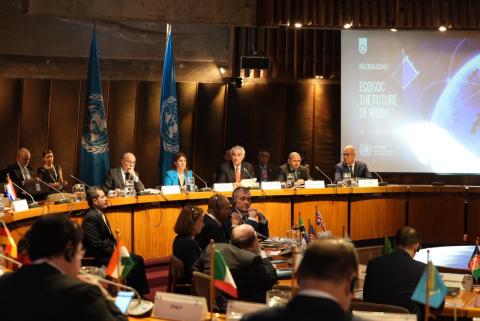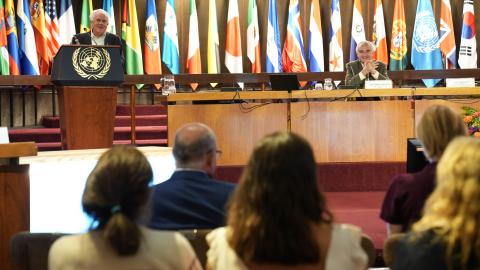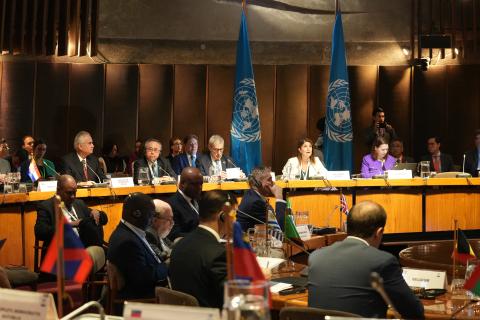News
The Executive Secretary of the Economic Commission for Latin America and the Caribbean (ECLAC), José Manuel Salazar-Xirinachs, presented today in Spain a recent special edition of the CEPAL Review, the organization’s main academic publication, published on the occasion of the Commission’s 75th anniversary (celebrated in 2023), in which he offers his vision regarding the major transformations needed for the region to move towards a more productive, inclusive and sustainable development model.
The senior United Nations official gave a keynote lecture based on his own article published in the Review entitled “Rethinking, reimagining and transforming: The ‘whats’ and the ‘hows’ for moving towards a more productive, inclusive and sustainable development model”, at an event held at Casa de América in Madrid. He was received by León de la Torre Krais, Managing Director of Casa de América, and his presentation was commented upon by José Antonio Sanahuja, Special Advisor for Latin America and the Caribbean to the High Representative of the European Union for Foreign Affairs and Security Policy. The Ibero-American Secretary General (SEGIB), Andrés Allamand, was also in attendance.
In his lecture, José Manuel Salazar-Xirinachs reiterated that the region is caught in three development traps: a trap of low growth, one of high inequality and low social mobility, and another of low institutional and governance capacity. Furthermore, with the aim of facilitating a comprehensive understanding of the region’s development challenges, ECLAC’s Executive Secretary identified a ten-point catalogue of structural gaps that constitutes a list of ten priority areas for promoting major transformations in development models – meaning they are priority areas for action on public policy and collective efforts aimed at transformation.
In addition to this catalogue – which provides strategic assessment and direction regarding “what to do” to close these gaps – there is a critical, cross-cutting area involving the questions and challenges related to “how to do it.” In other words, how can these major transformations be managed? This leads to the issues of governance, institutional capacities for effective public policies, social dialogue and the political economy of reforms. With regard to institutional capacities, they can be divided into four main categories: technical, operational, political and prospective capabilities (TOPP capacities), which are part of the conceptual framework laid out regarding how to manage these necessary transformations.
Salazar-Xirinachs emphasized that in 2023 Latin America and the Caribbean concluded an even more lost decade than the “lost decade” of the 1980s, growing just 0.8% on average since 2014. This demonstrates that low growth is not just a circumstantial problem but instead reflects lower growth in the region’s trend GDP, he said.
“We are sick with low growth, and this no less in an era of globalization, accelerated technological change, the digital revolution and now Artificial Intelligence. If we continue this way, we are going to lose social peace, become increasingly unequal and violent societies, have more people migrating, and lose democracy, because democratic life is incompatible with a stagnant economy and a frustrated citizenry without hope for a better future,” he indicated.
“This special 75th anniversary issue sets forth a vision regarding the economic and social development challenges in the region under the new globalization and world economic conditions; it calls for rethinking, reimagining and transforming development models and policies in the region; and it makes a series of proposals with an emphasis on the future that can help forge a new consensus on development, and on how to move towards a more productive, inclusive and sustainable future,” the Executive Secretary explained.
This special edition of the CEPAL Review includes 11 articles by prominent specialists from ECLAC, but also academics and officials from other institutions, on the ten areas of structural gaps that the United Nations regional economic commission sees today as countries’ critical challenges for making progress on transforming development models.
In addition, this issue includes the text of the XVII Raúl Prebisch Lecture from 2023, delivered on October 30 of last year by Rebeca Grynspan, Secretary-General of the United Nations Conference on Trade and Development (UNCTAD), and entitled “Globalization Disrupted: Prebisch, Trade Imbalances, and the Future of International Economics.”



